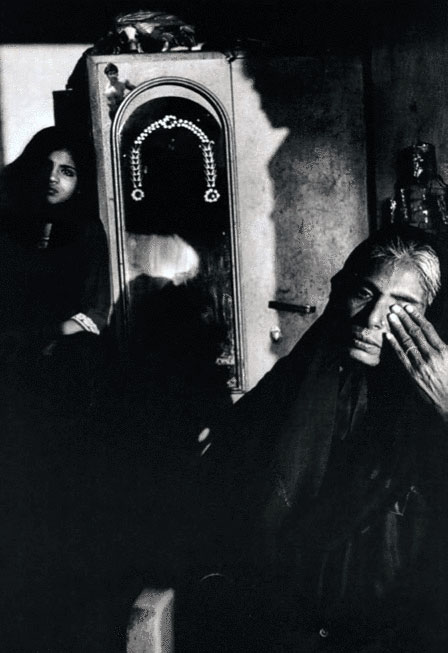Mehboob Bi

I call her my adopted mother, she says I am her daughter and that I’ll be there for her whenever she needs me. I just hope I will be, but these days I’m far away in England and I can’t stop worrying about her.
I first met Mehboob Bi when Tim and I were filming with the People’s Tribunal – this is when she lived in her old house, it was a lot better than the house she lives in now, but the moneylenders took it.
She had mortgaged it to get money for medicines for her sick husband, Chand Miya. He told her not to spend money on him, she replied, ‘How can I not?’
Now she has moved to a corner of Qazi Camp to a house without a roof. In the monsoon the rain comes right in. The house is beside the stinking naala (an open sewage ditch). It was the only place she could find. I went to see the Chief Minister to ask him for some money for a new roof. He gave me 500 rupees, so I just spat in the earth outside his house. After this Raghu Rai the photographer and some others paid for a new roof.
Mehboob Bi, she has the most wonderful presence, looks straight into your eyes like she knows the truth.
The film cameraman was being an asshole and Mehboob Bi began to cry. I went and sat next to her and hugged her and cried with her. She had just lost Chand, she was emotionally raw. You could see the pain and feel it in her. Tim and I then took a French journalist to her house. In the one room where everyone slept there was a goat tied to the steel bed. When he offered her money she refused to take it, so he left it under her pillow.
Mehboob Bi was married to Chand Miya. She did not belong to Bhopal. When she arrived here life was really easy as Chand Miya was working for Union Carbide.
‘We were so happy. We used to be well off, but my Kismet was written in Bhopal.’ Even today when she speaks of Chand tears roll from her eyes. She is so deeply wounded, so hurt. The gas has taken everything.
From the first time I saw her to the time when I left for England her face has weathered. Her daughter, the youngest one, was so beautiful and wild, she looked a lot like her mother in the picture that Mehboob Bi shows so proudly of her and her husband. She showed us an album of her pictures from before her marriage. She was stunning, dressed in short kurtas, two plaits and curls on the sides of her cheeks. One of her daughters said ‘Ammi looks like Mala Sinha.’ ‘No,’ said the other one, ‘she’s like Sadhna.’ (Both Indian filmstars.) ‘Chal hat pagli ladki’. Go on with you silly girl. That is what she said to her daughter with a coy smile.
When her daughters were small and there was no food Mehboob Bi used to give them water at night to fill their stomachs.
‘Afterwards I came to know that in many places the wells have been poisoned by that factory, the same cursed place that tried to kill us all with gas.’
So many years after the disaster Mehboob Bi suffers from serious headaches, often faints and gets very high temperatures for which there is no clear or obvious cause.
‘I am waiting, daughter,’ she tells me. ‘I am just waiting to go. I’m so tired, but who will look after these children then? The debt collectors will tear them apart, so the least I can do is spare them from debt before I go.
‘My husband warned me how dangerous the chemicals were. If by mistake you put your hand into them your hand would dissolve.
‘The day after the tragedy when we came back home our utensils were covered with a green coating. Chand Miya did not let us come into the house; he cleaned everything up, washed every corner of the house before he let us come in.
‘The days just before the disaster were the last few days I saw him happy. Our miseries began on that night. All of us had breathed the gas, but he most of all. When he got really ill and could no longer work...I...we ran short of money and I started work for the first time. He apologised to me for putting me through this.
‘I said, "jaan hai to jahaan hai," if we have life we have the world.' He often told me not to spend the money on him and his illness.
'I will die,' he said, 'don’t waste your money on me.' ‘And he did. He left me alone.’
Narrated by Farah Edwards, a Bhopali woman who met her husband Tim when he cycled from Brighton to Bhopal to raise funds for the Bhopal Medical Appeal.

